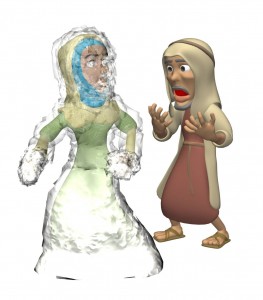Genesis 19, The story of Lot and us. Is Lot a picture of the typical modern born-again believer whether Christian or Messianic Israelite? I believe so. In saying this, as a pastor and having been a watchman on the spiritual wall for many years, I see very little if any differentiation (broadly speaking) between Christians and most Messianics, for the spiritual condition of both groups is fundamentally the same.
Primarily what differentiates the two groups is the nomenclatures each group uses and the outward religious trapping or externals each uses to identify itself. What about Torah, you may ask? Don’t Messianics obey the Torah and Christians do not? My response is that there is not a huge difference between the two—at least not from the Creator’s perspective who looks at hearts, and not merely superficiality of outward appearances and religious trappings.
In reality, both born-again Christians and born-again Messianics follow Torah principles to one degree or another. The only difference is that the former group does not claim to follow Torah, but teaches that it was “done away with,” but in fact, to a certain degree, Christians do follow the “moral” principles of the Torah and tithing. On the other hand, a majority of Messianics profess loudly and proudly to keep Torah, but largely, in practice (except for an often half-hearted adherence to the observance of the Sabbath and the biblical feasts and the biblical dietary laws) don’t, or do so only in a way that is copacetic and convenient to the secular, post-Christian society and lifestyle to which all Westerners have become addicted. In addition, many Messianics have fallen victim to a more diminished view of Yeshua in favor of a more letter-of-the-law (or legalistic) approach to their religious expression. This is something that Paul the apostle loudly decried, but it seems that many have failed to heed his warning.
This mentality of spiritual compromise and syncretism with the world or accommodation (as Francis Schaeffer termed it when describing the secular humanistic bent of the modern Christian church) fits Lot to a tee, as we shall see below. Spiritually, Lot typifies most Christians and Messianics on earth today in these last days.
In analyzing this subject, we must realize that the Creator looks more at our heart, not at the externals and trappings of our religious expressions. Within both Christian and Messianic groups there are those who “draw near with their mouths, but their hearts are far from me” (Isa 29:13 cp. Matt 15:7–9). For these reasons, I see both religious groups to be fundamentally the same and, therefore, not unlike Lot, our biblical character of the day.
In his Olivette Discourse, Yeshua warned us that as it was in the days of Noah and Lot, so it would be in the day of his return. He then left us with this famous warning, “Remember Lot’s wife!” (Luke 17:32). Despite Lot’s failings, Scripture’s last verdict concerning Lot’s spiritual state is that he was a just or righteous man who was vexed or oppressed by the wickedness of the society in which he found himself (2 Pet 2:7). I believe that this is an apt description of the average redeemed believer of the last days be they Christian, Messianic Jewish, Messianic Israelite, Hebrew roots Christian, Christian Zionist, Jewish Christian, Nazarene, Notzrim or any other spiritual designer label you care to choose.
Despite Lot’s predisposition toward selfishness, greed, or seeking approval of the world, his attempts to appease evil doers by compromising his morals (the old go-along-to-get-along-mentality), and his reluctance to leave a wicked society even at risk of peril to his life and those of his loved ones, YHVH still considered Lot to be a righteous man worthy of divine favor and grace such that YHVH sent heavenly messengers to lead Lot and his family to safety. If Lot is an example of the typical modern Laodicean believer, then there is hope for us all in light of YHVH’s grace toward Lot.
We can learn an important principle from the example of Lot. It is this. Although the Bible calls him righteous, this is not the case with his wife and children. Although this is speculation, it seems that Lot likely married a daughter of Sodom, which is why he was granted a seat (a place of judicial authority) in the gate of that city. If this is so, this perhaps answers the question why Lot’s other sons and daughters found it impossible to leave Sodom and why Lot’s wife left that city only reluctantly. In reality, her heart was still there, which is why she suffered its judgment. Many modern believers are like Lot’s wife and children—they are too in love with the world. Many will be judged as per Revelation 18:4 because they refused to leave end-times Babylon.
In Deuteronomy 32, the Song of Moses, which is a prophecy concerning what would become of Israel after the death of Moses all the way down to the end of the age (or “Israel’s latter end,” Deut 32:29), Moses likens Israel to Sodom and Gomorrah (verse 32). In Revelation, Jerusalem spiritually is likened to Sodom (Rev 11:8).


